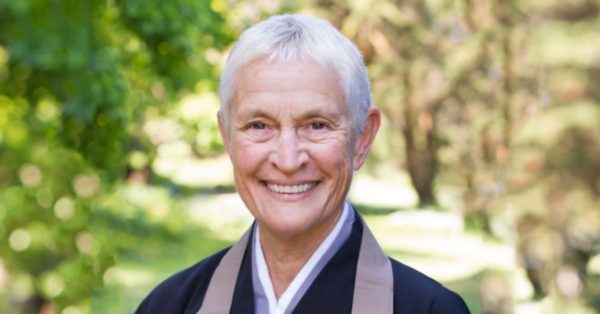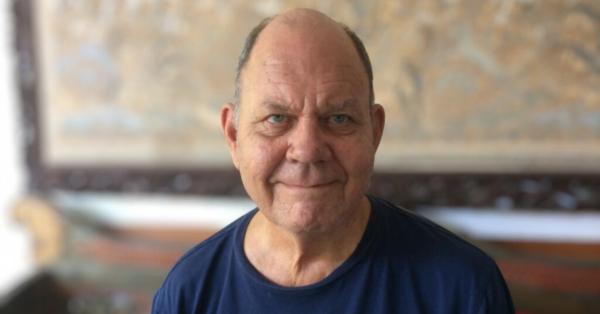
Photo by Anita Bowen
By Tova Green
Fu Schroeder ascended the Mountain Seat in March 2014 to become Green Gulch Farm’s Abiding Abbess. Ed Sattizahn ascended at the same time to become the City Center Abiding Abbot. They both stepped down from their abbatial positions on Friday, March 10, 2023.
Fu has lived at Green Gulch Farm for over 30 years.
“For me, becoming Abbess was more of a slide than a jump. I had been Tanto (Head of Practice) for seven years, Tenzo (Head of the Kitchen), Ino (Head of the Meditation Hall), and Head of the Guest Program. I knew all the nooks and crannies of Green Gulch. When Tenshin Roshi, and later Eijun Roshi, were Abbots at Green Gulch, they would go down to Tassajara to lead three-month practice periods. In their absence, as Tanto, I would hold the primary practice position for them. Becoming the Abbess at Green Gulch seemed like a step I had been prepared to take.
“One challenging aspect of being Abbess, or any senior leadership position, is the projections on us in our roles. I understood that was part of the job, meeting intimately with others and in doing so, being exposed. There’s a nakedness to these jobs. I couldn’t control how others saw me, of course, yet something about practicing the Buddha’s teaching with others makes it seem pretty safe. I trusted our practice as a community.
“During my nine years as Abbess some of the many challenges were around DEIA work, both related to our connection to the wider world as well as within the Green Gulch sangha. As my term is ending, the issues of diversity, equity, inclusivity, and accessibility are ones the community will still be facing … turning towards it. In founding this community so much was learned from the Buddhist cultures of East Asia. We know that it is time to listen and learn from other voices. And that Zen Center intends to go on learning from the wisdom and compassion teachings arriving from around the world. I’m optimistic.
“The pandemic had a big impact on Green Gulch. I remember before the pandemic walking into the zendo Sunday mornings to find it full of people, the dining room overflowing for lunch, and a shortage of parking. At the start of the pandemic we closed our public offerings and they were closed for nearly two years. Now, as we re-open to a limited number of outside guests, the fallout has been high both among new residents and visitors. And yet, I’m also optimistic about the new generation of students. Sincere people of all ages, continue arriving to give us a try.
“Earlier in my residence, there had been times when I thought of leaving Green Gulch and starting a sitting group of my own, but I genuinely felt there was a ‘student loan’ I needed to repay. I owe Zen practice a huge debt of gratitude. Finding San Francisco Zen Center, where I could join with others who were addressing the causes of suffering, was more than I could have dreamed about.
“Thirty years ago, somewhat early on in my time at Green Gulch, my partner at that time Dr. Grace Dammann and I adopted a baby, our daughter Sabrina, who we raised here at Green Gulch. I don’t know how we could have cared for that child without the support and love of the sangha.”
In 2008, Grace and Sabrina were in a head-on collision on the Golden Gate Bridge. Grace was hospitalized for several months and needed 24-hour care when she returned to Green Gulch. “I was Grace’s primary caregiver for seven years and primary parent for Sabrina while Grace was in recovery. San Francisco Zen Center was kind and generous in supporting our family through that difficult time.” [There’s an award-winning film, “States of Grace,” by Helen S. Cohen and Mark Lipman that tells Fu and Grace’s family story.]
Fu became Abbess during that time. After Sabrina had left for college, and Fu was asked to go to Tassajara to lead a 90-day practice period, Grace moved to a senior living community in Mill Valley where she is, according to Fu, “the star resident.” Grace is also a Dharma teacher, having been shuso (head student) at Green Gulch a few years ago. Happily, both Grace and Fu have new partners, and Sabrina lives in Los Angeles with her three cats and a dog and works as a paralegal.
Fu was born in San Francisco and grew up on the Peninsula. As a child she longed for what she would now recognize as a spiritual connection. Her family attended church with a wise and kind priest. “I was drawn to the sacred space, the singing especially—but also the ritual elements, the flowers on the altar, candles, and holy communion. It held me until I realized I could no longer believe in a ‘God.’ As many are, I was uncomfortable referring to God as ‘him’ or as the ‘father almighty.’ I lost faith in the very basis of the tradition. I became a hippy activist and decided to teach high school in order to go on studying and to have the summers free for travel.” She attended San Francisco State, where she met a large number of like-minded people.
Fu continued to have a spiritual thirst. After college, when she was working for the Trust for Public Land, she learned that a colleague, John Nelson, whom she saw as “a kind of saintly person,” was a Zen student. John invited Fu to go with him to City Center for a meal. Fu had a feeling of recognition when she entered the building: “There was my tribe. I needed to be with them.”
Fu lived at City Center for about five years, working at the Tassajara Bakery and Greens Restaurant, until Richard Baker, the Abbot at that time, said, “It’s time for you to go to Tassajara.” Although she was anxious about going to the monastery because of the long initiatory sitting called tangaryo, she did go and ended up staying for two years. “It changed my life,” she recalls. Fu returned to City Center and then, after Richard Baker left, went back to Tassajara. She was ordained as a priest by Tenshin Reb Anderson and received the Dharma name Fu Ryu Do Shin / Wind Stream, Way-Seeking Heart.
After stepping down, Fu will remain at Green Gulch Farm for one more year as a Senior Dharma Teacher. She wants to continue to support the Family Program, serve on the Curriculum Committee and the DEIA Committee, and offer Dharma teaching, including Sunday talks and classes. In the future, she would like to paint, draw, hike, travel, and play her flute. She also wants to continue studying and sharing the Dharma in whatever way she can. She has been invited to move to Enso Village in spring 2024.











